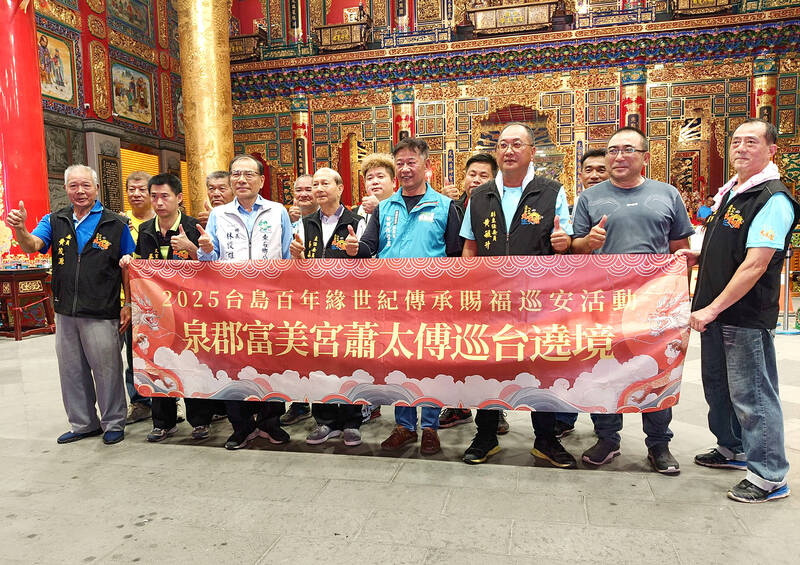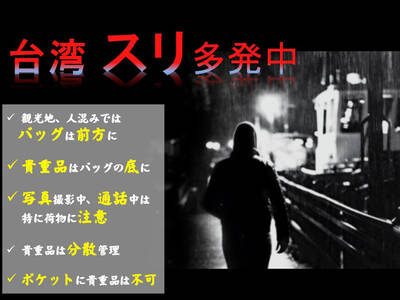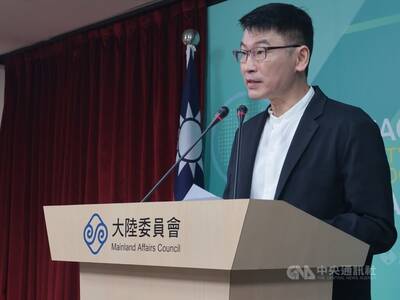Ten representatives of China’s Fumei Temple (富美宮) left Taiwan after only a brief stay, following allegations that they were engaging in Beijing’s “united front” activities through religious events.
The delegation first asked the Taiwan Wangye Alliance Association to escort a statue of the Taoist deity Xiao Taifu (蕭太傅) from Fumei Temple to Taiwan, an official who spoke on condition of anonymity told the Liberty Times (the Taipei Times’ sister newspaper).
The Taiwanese association was then charged with organizing a small pilgrimage for the deity in Taiwan and helped it join the annual Baishatun Matsu Pilgrimage of Gongtian Temple (拱天宮) in Miaoli County’s Baishatun (白沙屯), which ended on Sunday.

Photo from the Beauty of Dongshih Facebook group
Fumei Temple chairman Chen Shuxian (陳淑賢) and other representatives arrived through another group invited by the Yilan County Farmers’ Association, the official said, adding that the group was said to be invited to visit agricultural technology facilities in Taiwan.
The group’s tour route purposefully did not overlap with that of the pilgrimage, to circumvent the review process of the Mainland Affairs Council, the official said.
Regulations stipulate that Chinese temples must attain approval from the Taiwanese government before they are permitted to organize pilgrimages in Taiwan, they said.
The religious delegation intended to bypass Taiwan’s review mechanism for cross-strait religious events by asking Taiwanese to escort the statue to Taiwan first, with the representatives of the temple arriving in a separate group, they said, adding that it was a new “united front” tactic.
Mainland Affairs Council Minister Chiu Chui-cheng (邱垂正) on Monday said during a legislative meeting that the council did not want Chinese conducting pilgrimages in Taiwan in manners that suggest their deity holds supreme authority over Taiwan.
They should not downgrade Taiwan’s status as a sovereign nation, even in the spiritual world, he said.
Religious exchanges should focus solely on professional discussions over customs and rituals, he said, adding that the event should not be politicized or turned into a “united front” ploy.
“We do not have Fumei Temple’s application for religious exchange on file,” Chiu told reporters. “We are investigating whether the group intentionally circumvented application procedures and submitted false ones.”
Fumei Temple, from Quanzhou in China’s Fujian Province, is believed to be one of the temples that Beijing has been cultivating to carry out its “united front” campaign in Taiwan.
Based on the Web site of the city’s ethnic and religious bureau, any religious exchange that the city has with Taiwan would focus on the concept of “roots,” adding that temple pilgrimages must be held regularly to reinforce people’s identification with the “homeland.”
Fumei Temple, along with Guan Yue Temple (關岳廟), Zheng Chenggong Shrine (鄭成功廟) and Matsu Temple (天后宮), are key in building a brand for local religious beliefs, as they have great influence over people, the Web site says.

The Japan-Taiwan Exchange Association has cautioned Japanese travelers to be vigilant against pickpockets at several popular tourist spots in Taiwan, including Taipei’s night markets, the Yongkang Street area, Zhongshan MRT Station, and Jiufen (九份) in New Taipei City. The advisory, titled “Recent Development of Concerns,” was posted on the association’s Web site under its safety and emergency report section. It urges travelers to keep backpacks fully zipped and carried in front, with valuables placed at the bottom of the bag. Visitors are advised to be especially mindful of their belongings when taking photos or speaking on the phone, avoid storing wallets and

ENDORSING TAIWAN: Honduran presidential candidate Nasry Afura said that Honduras was ‘100 times better off’ when it was allied with Taipei The Ministry of Foreign Affairs yesterday said it would explore the possibility of restoring diplomatic relations with Honduras based on the principle of maintaining national interests and dignity. The ministry made the remarks in response to reporters’ questions regarding an article titled: “Will Taiwan Regain a Diplomatic Ally?” published in The Diplomat on Saturday. The article said Honduras’ presidential election in November could offer Taiwan the chance to regain an ally, as multiple candidates have promoted re-establishing diplomatic relations with Taiwan. Honduras severed diplomatic ties with Taiwan in March 2023 in favor of Beijing, but since switching its diplomatic recognition,

Scoot announced yesterday that starting in October, it would increase flights between Taipei and Japan’s Narita airport and Hokkaido, and between Singapore and Taipei. The low-cost airline, a subsidiary of Singapore Airlines, also said it would launch flights to Chiang Rai in Thailand, Okinawa and Tokyo’s Haneda airport between December and March next year. Flights between Singapore and Chiang Rai would begin on Jan. 1, with five flights per week operated by an Embraer E190-E2 aircraft, Scoot said. Flights between Singapore and Okinawa would begin on Dec. 15, with three flights per week operated by Airbus A320 aircraft, the airline said. Services between Singapore

The Mainland Affairs Council (MAC) yesterday announced a ban on all current and former government officials from traveling to China to attend a military parade on Sept. 3, which Beijing is to hold to mark the 80th anniversary of the end of the Second Sino-Japanese War. "This year marks the 80th anniversary of the end of World War II and the Republic of China’s victory in the War of Resistance [Against Japan]," MAC Deputy Minister and spokesperson Liang Wen-chieh (梁文傑) told a regular news briefing in Taipei. To prevent Beijing from using the Sept. 3 military parade and related events for "united